Mayumi Kubota, Ph.D.
Emeritus Professor
Kansai University
Osaka, Japan
Email: mkubota@kansai-u.ac.jp
Mayumi Kubota, Ph.D. has been an emeritus professor of Kansai University, Osaka, Japan since April 2023. Her research interests are intercultural communication and nonverbal communication. She does research from the perspective of phenomenology and semiotics.
She obtained a BA at the Department of Mathematics in Tokyo University of Science in 1978. After teaching at a high school for two years, she decided to serve as a Japan Overseas Cooperation Volunteer in Ghana. Japan Overseas Cooperation Volunteer is equivalent to the American Peace Corps. In Ghana, she taught mathematics at a secondary school for two years from 1980 to 1982. This experience led her to specialize in Intercultural Communication and Development education at Indiana University.
She obtained a Ph.D. from the Department of Speech Communication at Indiana University in 1991. The title of her dissertation is “The Use of Back Channel Behaviors by Japanese and American Bilingual Persons.” Based on this dissertation, the book Aizuchi ha hito wo ikasu (Make the most of listener’s responses) was published in 2001. In English, Aizuchi means the listener’s response or backchanneling. In Japanese language, there is the term “Aizuchi” and every Japanese knows that Aizuchi plays a significant role in a Japanese conversation.
Thanks to these experiences, she is educated in statistics, conversation analysis (qualitative methods) and research from intercultural communication point of views. She is particularly interested in investigating what “communication” is these days.
Her latest articles are The Effects of Learning Design Through Intercultural Exchange Based on Variation Theory, What is “Communication”?―Beyond the Shannon & Weaver’s Model―,” and she is the co-author of the book Intercultural Communication: Global mind and local affect.
For more than twenty years, she has been conducting gender analysis workshops for government officials from developing countries sponsored by the Japan International Cooperation Agency. Gender issues are also related to communication since a society itself is constructed from daily communication. Therefore, she is very interested in Social Constructionist ideas.

